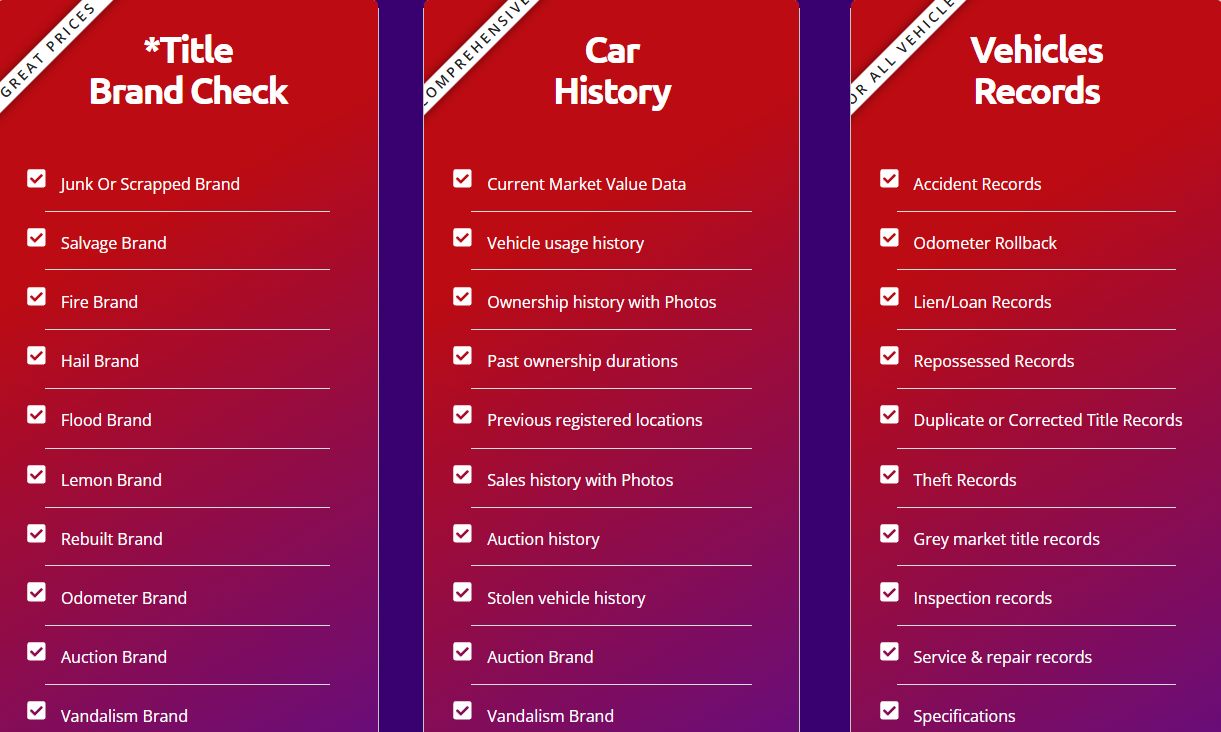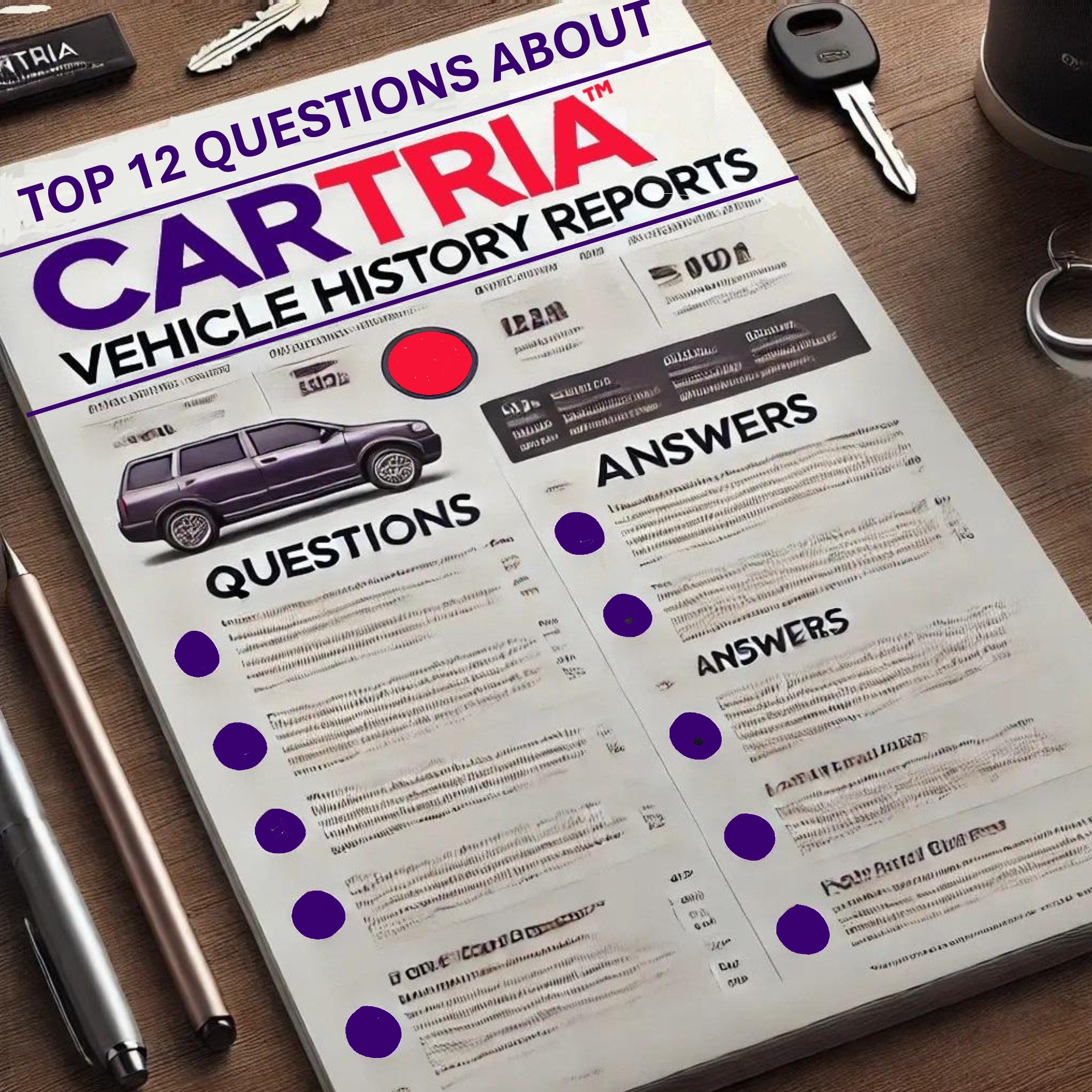When buying a used car, making an informed decision is crucial. A vehicle history report provides detailed insights into a car’s past, helping you avoid costly surprises like hidden accidents, title issues, or odometer fraud.
With CARTRIA™, you can get a comprehensive vehicle history report for just $7—offering the same accuracy as Carfax or AutoCheck but at a fraction of the cost. In this post, we answer the top 12 questions about vehicle history reports, helping you understand their importance and how to use them effectively when buying a car.
1. What is a Vehicle History Report?
A vehicle history report is a detailed document that provides information about a car’s past, including:
- Ownership history – How many owners and the duration of each ownership.
- Title status – Whether the car has a clean or branded title (e.g., salvage, rebuilt).
- Accident history – Records of reported accidents, including severity and location of damage.
- Odometer readings – Mileage records to check for consistency and detect tampering.
- Maintenance and service records – Information on routine maintenance and repairs.
CARTRIA™ provides comprehensive vehicle history reports that cover all these details, giving you all the facts you need to make a confident buying decision.
2. How Can I Obtain a Vehicle History Report?
You can obtain a vehicle history report by:
- Using the VIN (Vehicle Identification Number) – A unique 17-digit code found on the dashboard or driver’s side door.
- Visiting trusted websites like Cartria.com, where you can enter the VIN and get a report instantly.
- Checking with the car dealer or seller, as they may provide a report as part of the sale.
With CARTRIA™, you get a comprehensive vehicle history report for just $7, with no memberships or hidden fees. It’s the most affordable and transparent option in the industry.
3. What Information is Included in a Vehicle History Report?
A comprehensive vehicle history report typically includes:
- Title history – Information on the car’s legal status, including branded titles like salvage or rebuilt.
- Accident history – Records of reported accidents, airbag deployments, and damage severity.
- Odometer readings – To verify mileage accuracy and detect possible tampering.
- Ownership details – Including type of ownership (personal, commercial, rental) and location history.
- Maintenance records – Service history, including routine maintenance and major repairs.
- Recalls and warranty status – To check for open recalls or expired warranties.
CARTRIA™ provides detailed reports that cover all these aspects, helping you make an informed decision with confidence.
4. Why is Checking a Car’s Accident History Important?
Accident history reveals if a car has been in a collision, the severity of the damage, and whether airbags were deployed. This information is crucial because:
- Structural damage can compromise the safety and integrity of the vehicle.
- Airbag deployments indicate significant accidents, which can affect resale value.
- Unrepaired damage may lead to costly repairs down the road.
CARTRIA™ provides detailed accident history reports, ensuring you know the full story before making a purchase.
5. How Do I Verify a Car’s Title Status?
A vehicle’s title status indicates its legal status and history, including:
- Clean Title – No major issues reported.
- Branded Title – Indicates serious past issues such as salvage, rebuilt, flood, or lemon title.
A branded title is a label on a car’s title that shows it has had serious problems in the past, like major accidents, flood damage, or being declared a total loss. It warns buyers about potential issues with the car’s safety, value, or reliability.
CARTRIA™ provides accurate title checks, helping you avoid costly mistakes and potential legal issues.
6. What are Common Red Flags to Look For in a Vehicle History Report?
When reviewing a vehicle history report, look out for these red flags:
- Odometer discrepancies – Inconsistent mileage that may indicate tampering.
- Multiple ownership changes in a short period – This could indicate unresolved issues.
- Branded titles – Such as salvage, rebuilt, or flood damage, which lower the car’s value.
- Unresolved recalls – Safety hazards that need immediate attention.
With CARTRIA™, you get a comprehensive report that clearly highlights any red flags, ensuring you don’t get caught off guard.
7. How Reliable are Vehicle History Reports?
Vehicle history reports are highly reliable because they gather data from:
- DMV records – For title status and ownership history.
- Insurance companies – For accident claims and total loss records.
- Repair shops and service centers – For maintenance and repair history.
However, not all incidents are reported, so it’s recommended to:
- Cross-check the report with a professional inspection.
- Use a trusted provider like CARTRIA™, which sources data from reputable agencies.
8. Can a Vehicle History Report Show if a Car Has Been in a Flood?
Yes, vehicle history reports show flood damage if it has been:
- Reported to insurance companies as a total loss due to flooding.
- Branded as a flood title by the DMV.
Flood damage can cause severe electrical and mechanical issues. CARTRIA™ highlights flood damage clearly, so you can avoid costly repairs.
9. What Does It Mean if a Car Has a Salvage Title?
A salvage title means the car was declared a total loss by an insurance company due to:
- Major accident damage
- Flood or fire damage
- Theft recovery
These vehicles are often repaired and resold as “rebuilt” cars. They may be cheaper but come with higher insurance costs and lower resale value. CARTRIA™ provides accurate salvage title information, ensuring you make an informed choice.
10. How Can I Detect Odometer Fraud?
Odometer fraud is the illegal practice of rolling back the mileage to increase the car’s value. To detect it:
- Check for mileage inconsistencies in the history report.
- Compare mileage from different events, like registration and maintenance records.
- Look for physical signs of tampering, such as loose dashboard panels.
CARTRIA™ provides reliable odometer readings, helping you avoid odometer fraud.
11. Are There Free Vehicle History Report Options Available?
Some websites offer free vehicle history reports, but they are usually limited in detail. These reports may not include:
- Accident history
- Title branding information
- Detailed ownership history
For a comprehensive and affordable report, CARTRIA™ offers the best value at just $7, with no hidden fees or memberships.
12. How Often Should I Check a Vehicle’s History Report?
It’s recommended to:
- Check the vehicle history before making an offer.
- Review the report again after negotiating the price to ensure no changes occurred.
- If buying from a dealer, request an updated report to confirm no recent accidents.
CARTRIA™ makes it easy to check a vehicle’s history multiple times without breaking the bank.
Why Choose CARTRIA™?
With CARTRIA™, you get comprehensive vehicle history reports comparable to Carfax and AutoCheck for just $7. There are no memberships or hidden fees—just accurate, detailed information to help you make an informed decision.
Ready to Buy? Visit Cartria.com and get all the facts you need.



